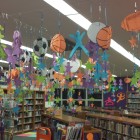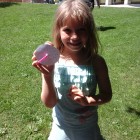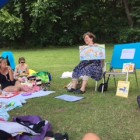If you walked into the Maplewood Library this past summer on a hot, sweaty day, odds are you’d see at least ten children carefully coloring and putting together one of many shape-based hanging pictures, which they would soon return to add pieces to. The ceiling was – and still is – adorned with hundreds of these colorful projects, and they are but one of the manifestations of local children’s dedication to summer reading. For some, the goal was to become a better reader; for others, it was to have their names published after demonstrating they had read at least 50 hours.
Over 1,400 Maplewood children spent their warmer months reading and writing to earn prizes, as they have in summers past. The Maplewood Library’s annual Summer Reading Club is a reading incentive program that rewards kids for spending time with words by reading and writing. The program was designed to appeal to kids who dislike reading or are struggling to read, but draws in kids who are avid readers, as well. This program is fully funded by the Friends of the Maplewood Library.
“Summer learning loss is a well-documented phenomenon, and describes the amount of learning students lose over the summer,” said Jane Folger, Head Children’s Librarian. “Studies show that students who do not engage in educational activities during the summer typically score lower on tests at the end of summer than they did at the beginning. Two to three months of learning can be lost in a very short period of time and this difference is cumulative over the years. Some researchers feel that learning loss during the summer contributes greatly to the achievement gap.”
It helps that children could earn coveted prizes such as an “emoji pillow” for 100 hours, and more fun trinkets along the way to keep them motivated. “Enthusiasm pours from their faces as they peer into the prize display case and exclaim “I’m going to read 75 hours this summer to get the Ninja prize,” said Folger.
To keep families involved with library activities, the Maplewood Library offers family-friendly programs and activities that allow kids to participate in mentally stimulating activities that are fun and not school-related year-round. Readers who aren’t intrinsically writers were drawn in as well: “To entice kids to write, and to address a national decline in writing skills, we offered quintuple credit for time spent writing,” related Ms. Folger. “Feedback from kids and parents has shown us that this additional motivation inspired many children to write much more ‒ book reviews, daily journals, and short stories.”
So how did kids fare this summer? With the tallies just in, they collectively read and wrote a whopping 24,000 hours. “This is a huge increase over last year, when kids read a total of 13,000 hours,” says Folger. This year, there were 159 Champion Readers — kids who read 50 hours or more over the summer. Fourteen of those children read more than 200 hours and 2 children (a 3rd and a 5th grader) read for more than 300 hours over the summer.
See the complete list of Champion Readers in the document attached below as a PDF:
“As adults we forget how hard it is to learn how to read, how difficult it is to master the English language,” says Folger. “But these children are climbing one of the steepest learning curves in the world, and accomplishing their dreams. Their sense of self-worth is visible when they come up to me and show me the prizes they earned. My heart still swells with pride along with them, even after 20 years of doing this.”
Parents are thrilled with their kids’ devotion to reading, however it happens. They often tell Folger that their first grader went from being a beginning reader to an enthusiastic one, or their second grader went from being a struggling reader to a confident one.
Children’s librarian Emily Witkowski put it this way: “In the same way that summer learning loss is cumulative, a love of reading and the library is cumulative. We see children who once attended our early literacy programs and who are now avid readers and learners. We hear from college students how much the summer programs meant to them, and how well they remember the excitement of reading and getting prizes. All these library ‘stories’ are a part of our daily lives, and are very important to the individual lives that make up this community. The summer programs are of true and lasting value to kids and families.”
To become a Friend of the Maplewood Library or otherwise donate, please visit this website.






